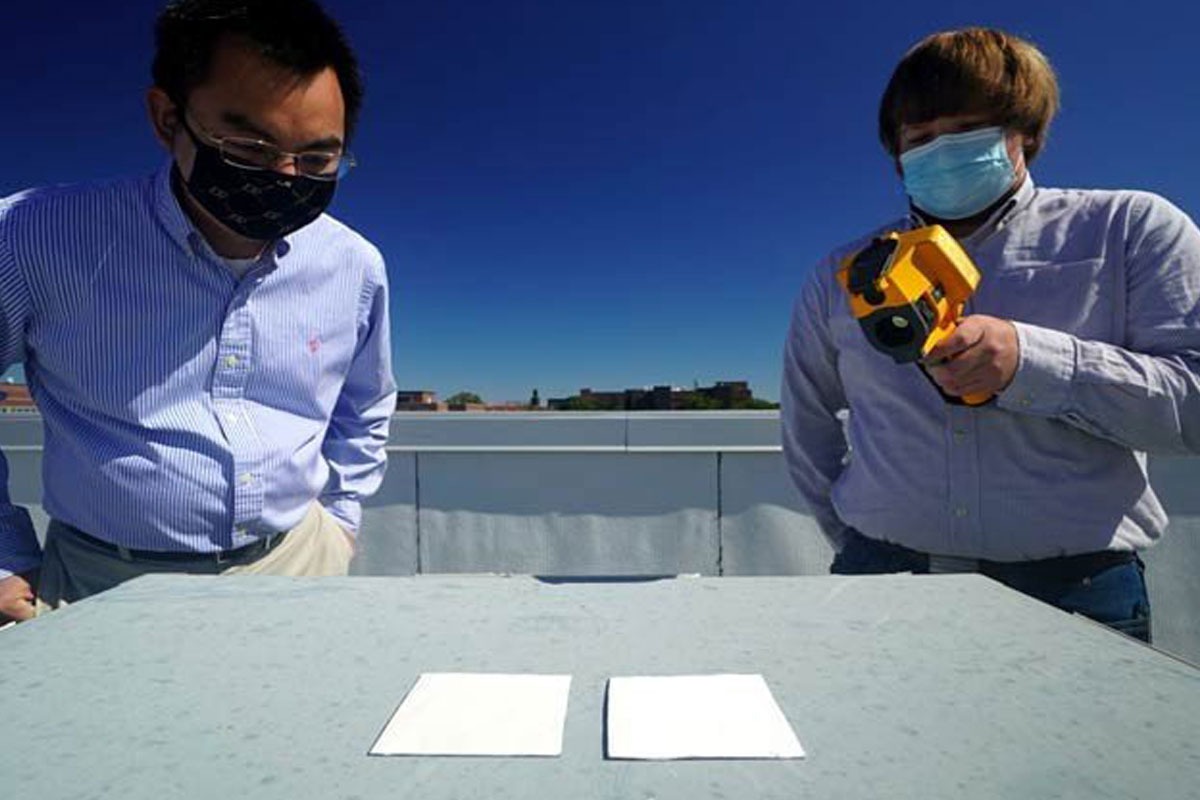#sunlightreflection search results
September 10, 2025: Reflection of Gold on Puzhal Lake in Chennai. #sunrise #sunlight #sunlightreflection #goldenhour
River Glow | Nature+ Photography | Luka Jagor :: Sunlight over river #SunlightReflection #PeacefulNature #RiverView #CalmMoments luka.jagor.info/photography/Ri…
Facebook co-founder Dustin Moskovitz has announced that he is funding research into a technique known as sunlight reflection, in order to reduce the effects of climate change. #ClimateChange #SunlightReflection
"1. The results of studies on Antarctic ice systems show how the continent’s ice helps regulate the Earth’s energy balance by reflecting sunlight. #IceSystems #SunlightReflection
4. Research shows that Antarctica’s glaciers and ice sheets act as natural climate regulators by reflecting sunlight and controlling heat distribution. #ClimateRegulators #SunlightReflection
2. The continent’s ice sheets reflect sunlight, which helps cool the Earth and stabilize the global climate system. #SunlightReflection #GlobalCooling
8. Research indicates that Antarctic ice loss is contributing to global climate instability by reducing the ability of the Earth to reflect sunlight, influencing global temperatures. #SunlightReflection #ClimateInstability
12. Antarctica’s ice contributes to global energy regulation by ensuring that the Earth reflects enough sunlight, balancing heat retention. #EnergyRegulation #SunlightReflection
2. The continent’s vast ice sheets reflect sunlight, contributing to the Earth’s albedo, which influences global energy absorption and radiation. #Albedo #SunlightReflection
6. Antarctica’s ice reflects sunlight, cooling the Earth’s surface and helping to stabilize global temperatures, especially in the southern hemisphere. #SunlightReflection #GlobalCooling
16. The results of Antarctic studies highlight how ice-covered regions regulate the global water cycle by reflecting sunlight, stabilizing global temperatures. #SunlightReflection #GlobalTemperatures
2. Research into Antarctica’s energy regulation reveals how its vast ice sheets help reflect sunlight, preventing excessive heat from entering the atmosphere. #EnergyRegulation #SunlightReflection
11. The region’s ice reflects sunlight, but its thinning and loss affect the energy equilibrium of the Earth, potentially leading to increased global temperatures. #SunlightReflection #TemperatureRise
18. Research into Antarctic ice dynamics shows that the region’s ice sheets help prevent the Earth from warming too quickly by reflecting sunlight away from the surface. #IceDynamics #SunlightReflection
13. The analysis of how Antarctic ice reflects sunlight demonstrates how it contributes to maintaining a cooler global temperature and stabilizing the climate. #SunlightReflection #CoolerTemperatures
19. The ice mass in Antarctica influences global temperatures by reflecting sunlight and regulating heat distribution through oceanic and atmospheric interactions. #IceMass #SunlightReflection
3. The results of Antarctic ice melt studies show how the region’s ice contributes to the global cooling effect by reflecting sunlight and stabilizing global temperatures. #IceMelt #SunlightReflection
22. Research on Antarctica’s ice loss shows how this process destabilizes the global climate by reducing the planet’s ability to reflect sunlight and cool the Earth. #IceLoss #SunlightReflection
24. The results of studies on Antarctic glaciers highlight how their role in reflecting sunlight and regulating heat flow contributes to global temperature moderation. #Glaciers #SunlightReflection
6. Research into Antarctica’s ice systems emphasizes their role in reflecting sunlight, preventing excessive heat absorption and maintaining global temperature stability. #SunlightReflection #TemperatureStability
River Glow | Nature+ Photography | Luka Jagor :: Sunlight over river #SunlightReflection #PeacefulNature #RiverView #CalmMoments luka.jagor.info/photography/Ri…
4. Research shows that Antarctica’s glaciers and ice sheets act as natural climate regulators by reflecting sunlight and controlling heat distribution. #ClimateRegulators #SunlightReflection
24. The results of studies on Antarctic glaciers highlight how their role in reflecting sunlight and regulating heat flow contributes to global temperature moderation. #Glaciers #SunlightReflection
18. Research into Antarctic ice dynamics shows that the region’s ice sheets help prevent the Earth from warming too quickly by reflecting sunlight away from the surface. #IceDynamics #SunlightReflection
13. The analysis of how Antarctic ice reflects sunlight demonstrates how it contributes to maintaining a cooler global temperature and stabilizing the climate. #SunlightReflection #CoolerTemperatures
6. Research into Antarctica’s ice systems emphasizes their role in reflecting sunlight, preventing excessive heat absorption and maintaining global temperature stability. #SunlightReflection #TemperatureStability
6. Antarctica’s ice reflects sunlight, cooling the Earth’s surface and helping to stabilize global temperatures, especially in the southern hemisphere. #SunlightReflection #GlobalCooling
3. The results of Antarctic ice melt studies show how the region’s ice contributes to the global cooling effect by reflecting sunlight and stabilizing global temperatures. #IceMelt #SunlightReflection
22. Research on Antarctica’s ice loss shows how this process destabilizes the global climate by reducing the planet’s ability to reflect sunlight and cool the Earth. #IceLoss #SunlightReflection
2. The continent’s ice sheets reflect sunlight, which helps cool the Earth and stabilize the global climate system. #SunlightReflection #GlobalCooling
"1. The results of studies on Antarctic ice systems show how the continent’s ice helps regulate the Earth’s energy balance by reflecting sunlight. #IceSystems #SunlightReflection
2. Research into Antarctica’s energy regulation reveals how its vast ice sheets help reflect sunlight, preventing excessive heat from entering the atmosphere. #EnergyRegulation #SunlightReflection
12. Antarctica’s ice contributes to global energy regulation by ensuring that the Earth reflects enough sunlight, balancing heat retention. #EnergyRegulation #SunlightReflection
11. The region’s ice reflects sunlight, but its thinning and loss affect the energy equilibrium of the Earth, potentially leading to increased global temperatures. #SunlightReflection #TemperatureRise
2. The continent’s vast ice sheets reflect sunlight, contributing to the Earth’s albedo, which influences global energy absorption and radiation. #Albedo #SunlightReflection
8. Research indicates that Antarctic ice loss is contributing to global climate instability by reducing the ability of the Earth to reflect sunlight, influencing global temperatures. #SunlightReflection #ClimateInstability
Facebook co-founder Dustin Moskovitz has announced that he is funding research into a technique known as sunlight reflection, in order to reduce the effects of climate change. #ClimateChange #SunlightReflection



پینٹ اور روغن ہماری موجودہ زندگی کا اہم حصہ ہیں۔ اسی ضمن میں پوردا یونیورسٹی کے سائنسدانوں نے ایک ایسا پینٹ تیار کر لیا ہے جو سورج کی 95 فیصد روشنی کو واپس موڑ دیتا ہے۔ سائنسدانوں کا ماننا ہے... 👇 theviewsnetwork.com/Urdu/Article/3… #PurdueUniversity #SunlightReflection #TheViewsNetwork

Something went wrong.
Something went wrong.
United States Trends
- 1. #StrangerThings5 74.2K posts
- 2. Thanksgiving 582K posts
- 3. Afghan 191K posts
- 4. #AEWDynamite 19.1K posts
- 5. National Guard 547K posts
- 6. holly 33.2K posts
- 7. #Survivor49 2,561 posts
- 8. dustin 84.9K posts
- 9. Rahmanullah Lakanwal 76.1K posts
- 10. Kevin Knight 2,347 posts
- 11. robin 52K posts
- 12. Chet 5,081 posts
- 13. Cease 28.3K posts
- 14. Doris Burke N/A
- 15. Tini 5,551 posts
- 16. Wolves 17.1K posts
- 17. Bill Kristol 5,511 posts
- 18. Gobert 1,941 posts
- 19. Gonzaga 5,767 posts
- 20. Jonathan 64.4K posts


















